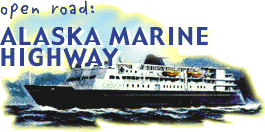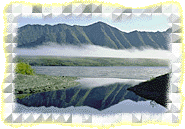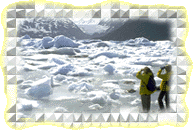 |
 |
 |
|
|||
|
The Open Road: Alaska Marine Highway Hal: Day one. It's August, late afternoon. We've just arrived in Bellingham, Washington at the Alaska Marine Highway Ferry Terminal. Everyone is milling around waiting to board.
Hal: We're silly with anticipation. In minutes we board the M/V Kennicott, a nine-story ferry boat that will drop us in Ketchikan two days from now. Later we'll take the Taku into Juneau and then circle back to Sitka on the Columbia. It's Alaska's oceanic version of a Eurail vacation. Our whole voyage costs just over $500 apiece, stateroom included, and we get the same million-dollar scenery as the glitzy cruise ships. Teresa: There are people here with almost as much luggage as we have. Teresa: We join a long queue filing onto the ship, tourists like ourselves as well as Alaskans returning home from a visit to the lower 48. We're a varied group: college kids staggering under overloaded backpacks, families with children, hardy senior citizens in Goretex and hiking shoes. We enter the ship through the car deck and take the elevator to the cabin deck. We could be in a mainland hotel -- until we reach our room.
Hal: We drop off our luggage and head out to explore. Everyone else is scurrying around just like us. Passengers are schlepping their luggage through the narrow doors of their staterooms. The top deck is already a tent city as folks without cabins set up camp. One mother pulls her son away from a video game. People crowd the railings, trying to find the best view. We bump into one of the crewmen rushing to get the ship ready to shove off.
Teresa: Passengers are allowed down on the car deck at regular intervals to take care of their livestock and pets. Since Alaskans depend on these huge ferries to transport not only themselves but their worldly goods, you're as likely to see horses and cows down here as cats and dogs. We meet up with Dan and Christine Mallick from Tea Harbor, north of Juneau. They are feeding a beautiful Morgan horse.
Hal: It's late afternoon and we're back on deck, drunk with the drama of this endless coastline where a green carpet of trees and brambles crowd narrow black beaches and bluffs. The water is glassy smooth. We pass islands, inlets, spits, all a maze of waterways leading north. Only occasionally do we pass clusters of houses perched on the rocky shores.
Hal: As we get closer the bald eagle eyes us for just a moment before he jerks his head around to look at something more important. After all, we're just tourists. He is part of the Alaskan frontier. Teresa: Day four. We left Ketchikan this afternoon on the M/V Taku. It's now almost midnight and we're stopped dead in the water, fogged in before some dangerous straits. All day the fog has swirled around us, one minute socked in so close we couldn't see past the rail on the deck, the next rising and waving like long silk scarves until it disappeared entirely. At dusk it descended again in earnest. The captain just announced that the tide has turned and we can't get through the straits until morning. This will put us into Juneau eight hours late, but I wouldn't trade the beauty of this day for anything.
Hal: Day seven. Today we embarked on the shortest leg of our journey, from Juneau to Sitka, and asked George Brereton, captain of the M/V Columbia, if we could join him on the bridge to learn about the hazards of navigating these waters. During his five years as ferry captain, Brereton has earned a spotless safety record. Still, he's seen some pretty strange things.
Hal: For Phyllis Johnson, Alaska is heaven, a place to soothe the mind and possibly heal the body. For the Mallicks, it's a place where a horse matters more than a car. For sportsmen, it's a paradise. It's a nature lover's nirvana, a history buff's last frontier. Teresa: Alaska still holds a vestige of that pioneer dream. It's a place for people who feel like they don't quite fit into the modern world, who want more room, more freedom. A place far away from the crush of our over-scheduled lives. Teresa: On the Open Road, I'm Teresa Jordan with Hal Cannon for the Savvy Traveler. Here's a book about the Alaska Marine Highway from Amazon.com
|
 | American Public Media Home | Search | How to Listen ©2004 American Public Media | Terms of Use | Privacy Policy |

 Hal: Day two. We've been at sea for 18 hours and we're getting to know the
impromptu community that sprouts up on voyages like these. A group of
20-year-olds sit around a guitar picker named Dean in the solarium. Grandpa
Carl plays cards with three youngsters on the forward deck. Travel by boat
lends a sense of leisure with few responsibilities -- unless, like many of
the passengers who actually live along the Inside Passage, you have brought
an animal along.
Hal: Day two. We've been at sea for 18 hours and we're getting to know the
impromptu community that sprouts up on voyages like these. A group of
20-year-olds sit around a guitar picker named Dean in the solarium. Grandpa
Carl plays cards with three youngsters on the forward deck. Travel by boat
lends a sense of leisure with few responsibilities -- unless, like many of
the passengers who actually live along the Inside Passage, you have brought
an animal along.
 Hal: I've been spying on a woman over the past couple of days sitting in
one of the forward observations rooms. She is absolutely riveted by the
scenery, and she has the most contented smile on her face that I've ever
seen. I'm curious what brought her on this journey, and I finally screw up
my courage and introduce myself. I learn that her name is Phyllis Johnson,
she's a teacher from Brooklyn, New York, and she's dreamed about coming to
Alaska her whole life. She also tells me she has cancer. She's been through
two surgeries and radiation therapy and she adds that she should be in
treatment right now...but postponed it to take this trip.
Hal: I've been spying on a woman over the past couple of days sitting in
one of the forward observations rooms. She is absolutely riveted by the
scenery, and she has the most contented smile on her face that I've ever
seen. I'm curious what brought her on this journey, and I finally screw up
my courage and introduce myself. I learn that her name is Phyllis Johnson,
she's a teacher from Brooklyn, New York, and she's dreamed about coming to
Alaska her whole life. She also tells me she has cancer. She's been through
two surgeries and radiation therapy and she adds that she should be in
treatment right now...but postponed it to take this trip.